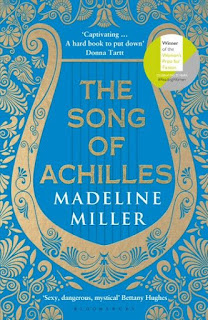The Trojan War is such a familiar story from Greek mythology, having been re-interpreted so many times. Homer made these events famous in his epic poems The Iliad and The Odyssey, and they have been retold in various forms - poems, plays, films, songs - ever since. I have recently been revising these myths through novels which retell the tales from the perspective of characters who had previously not been given a voice such as Pat Barker's The Silence of the Girls (2018) and The Women of Troy (2021), narrated by Briseis, the slave who was Achilles' war prize.
Madeline Miller spent ten years writing her first novel, The Song of Achilles (2011), breathing new life into the story of Greece's most famous warrior. This novel tells the story of Achilles from the viewpoint of Patroclus, Achilles' closest confidante, friend and lover.Patroclus is the son of Menoetius. As a young boy, he accidentally kills another boy and is exiled to Phthia, placed in the care of Peleus, the father of Achilles. When the two boys meet they are complete opposites - Achilles strong, brave and athletic; Patroclus introverted, innocent, intuitive. But Patroclus soon befriends Achilles and travels with him to Mount Pelion to be educated by Chiron, the Centaur. Here they learn warcraft, healing, cooking and other life skills. Slowly, they also discover their deep love for one another.
Achilles' mother Thetis hides her son on Skyros to keep him away from the war that is now building in Troy. She is aware of a prophecy that her son will become a legendary warrior, but he will die young, after killing Hector in battle. But Achilles cannot avoid his fate and before long he is his way to Troy and command his Myrmidon army in a decade-long war.
In selecting Patroclus as narrator, Miller allows the reader to bear witness to the events and see another side of Achilles, with Patroclus serving as his moral compass. Achilles is known for his wrath, his brutality on the battle field. But here, we see more tender moments between the two men. Miller's Patroclus is a lover, not a fighter, and over the course of the novel we see his character grow and display a different kind of bravery.We know how this story will play out, but Miller's poetic writing and portrayal of this relationship makes the tale fresh and exciting. As a reader, I was invested in these characters and was keen to see how Miller would write the end of their tale. It was wonderful to read of the love these men had for one another.
In terms of comparison, I think I would have enjoyed The Song of Achilles more if I had not read Barker's version of this story in The Silence of the Girls, which I found to be superior. I also preferred Madeline Miller's second novel Circe (2018) which is one of the best novels I have read in recent years and started me on this journey through ancient myths.
The Song of Achilles won the Women's Prize for Fiction in 2012. Madeline Miller has announced that she is working on her next novel, taking on the story of Persephone. Cannot wait for this to be published!




